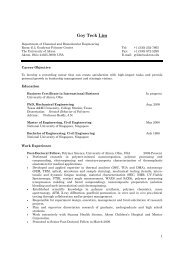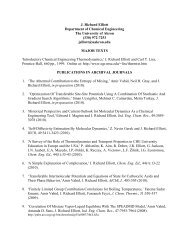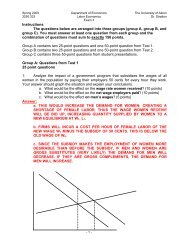Sociology of the Anarchists - Gozips.uakron.edu - The University of ...
Sociology of the Anarchists - Gozips.uakron.edu - The University of ...
Sociology of the Anarchists - Gozips.uakron.edu - The University of ...
You also want an ePaper? Increase the reach of your titles
YUMPU automatically turns print PDFs into web optimized ePapers that Google loves.
Discussing and writing assignments<br />
Focusing on facilitating discussion in addition to lecturing seems only logical from an<br />
anarchist perspective, and <strong>the</strong>re's probably few teachers who'd say that discussion cannot<br />
be helpful to learning. It takes a skilled teacher to fairly, justly, and dynamically facilitate<br />
discussion, and I've been in awe <strong>of</strong> more than a few in my life. It takes skill and<br />
experience to not just talk over students and to wait for <strong>the</strong>m to give feedback—it's<br />
teachers who usually monopolize <strong>the</strong> discussion. Keeping that in mind is important.<br />
Finding ways to gain <strong>the</strong> trust <strong>of</strong> students, empower <strong>the</strong> quieter students, and to inspire<br />
<strong>the</strong>m to find an interest in <strong>the</strong> topics taught probably takes a lot <strong>of</strong> vigilance and planning.<br />
It reminds me <strong>of</strong> McKeachie's earlier comments about how some might view group work<br />
as being lazy and an attempt to get out <strong>of</strong> lecture planning work; but that in fact it's even<br />
more work to plan group work. I imagine discussion facilitating takes just as much preplanning<br />
and discipline. I've facilitated meetings before, and it's a lot <strong>of</strong> work—to allow<br />
for a diverse participation in discussion, to keep <strong>the</strong> discussion on-track and oriented<br />
toward <strong>the</strong> group's goals, and to help <strong>the</strong> group reach it's goals. Facilitating a class<br />
discussion has to be just as much work. But, as with <strong>the</strong> organizations I've been a part <strong>of</strong>,<br />
<strong>the</strong> class would probably really benefit and feel very useful, empowered, active, and<br />
engaged as a result.<br />
Learning student interests and finding out <strong>the</strong>ir opinions (possibly at <strong>the</strong> beginning <strong>of</strong> <strong>the</strong><br />
course) seems crucial for discussion in class. For me, I think we should be tailoring a<br />
large part <strong>of</strong> our discussions and lectures to things that are ei<strong>the</strong>r important to students<br />
(whe<strong>the</strong>r all <strong>of</strong> <strong>the</strong>m articulate it or not—e.g. many students are political, but intentionally<br />
avoid talking about it) or things that interest <strong>the</strong>m. Not to suggest that we avoid <strong>the</strong> core<br />
concepts we teach, but to make <strong>the</strong>m relevant and to ei<strong>the</strong>r integrate <strong>the</strong>ir interests into<br />
our lectures OR to integrate our lectures into <strong>the</strong>ir topics (that'd be bold, huh?).<br />
I appreciated Bidwell's (1995) practice <strong>of</strong> not necessarily feeling <strong>the</strong> need to grade all<br />
writing assignments and that we should focus upon helping (to a limit) students improve<br />
writing skills. <strong>The</strong> informal writing students do can be really helpful, especially if <strong>the</strong>re's<br />
a relationship <strong>of</strong> exchange with <strong>the</strong> instructor that is focused upon improving <strong>the</strong>ir ideas,<br />
but at <strong>the</strong> same time removes <strong>the</strong> pressure <strong>of</strong> students to do mediocre, acceptable, and by<strong>the</strong>-book<br />
work. She's probably correct in arguing that an instructor might not want to<br />
outright say that such assignments won't be graded, o<strong>the</strong>rwise students might not take<br />
<strong>the</strong>m seriously (I imagine I might not, in certain circumstances), and view <strong>the</strong>m instead as<br />
a learning opportunity.<br />
Teaching social movements<br />
I would like to (and have already) teach social movements. I feel that social movements<br />
are <strong>the</strong> one place that intersect (as Alain Touraine argues) with all <strong>the</strong> various subdisciplines<br />
<strong>of</strong> sociology. <strong>The</strong> topic is <strong>of</strong>ten found at <strong>the</strong> end <strong>of</strong> introductory textbooks<br />
because it summarizes <strong>the</strong> efforts to deliberately (or inadvertently and spontaneously)<br />
address <strong>the</strong> issues <strong>of</strong> class, race, gender, sexuality, power, capitalism, et al.<br />
[ Williams 102 ] [ this is a draft. do not cite. ]






